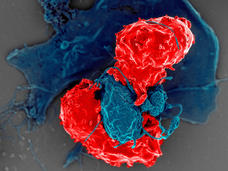| New from NCI |
| Helping Survivors Cope with Anxiety and Distress from Cancer |
 |
|
When treatment ends, many people with cancer don’t feel ready to celebrate or move on with their lives. Learn about research efforts that are finding ways to help survivors cope with anxiety and distress after cancer. |
| Boosting Certain Immune Cells Helps the Immune System Find Pancreatic Cancer |
 |
|
Scientists may have found an important clue as to why immunotherapy tends to not work for people with pancreatic cancer. In part, the answer may lie in the number of special immune cells, called dendritic cells, in the tumors. |
NCI Part of Effort to Assess Coronavirus Antibody Tests
NCI is working with other federal agencies to find out whether SARS-CoV-2 antibody tests that are on the market are accurate. SARS-CoV-2 is the virus that causes COVID-19. Learn more about these efforts and why they are important. |
| New Treatment Option for Colorectal Cancer that Has Spread |
 |
|
Some people with colon or rectal cancer that has spread have a new treatment option. Learn about the Food and Drug Administration's (FDA) recent approval of encorafenib (Braftovi) in combination with cetuximab (Erbitux). |
New Imaging Technique Helps Detect Prostate Cancer that Has Spread
In clinical trials, a new imaging technique called PSMA PET-CT has been shown to find prostate cancer that has spread. Finding cancer that has spread can help doctors decide on the best treatment.
|
| PDQ Updates |
Melanoma Treatment
We’ve revised this summary with updated treatment options for stage II melanoma and stage III melanoma that can be removed by surgery. |
| FDA Approvals |
|
New Drugs for Breast Cancer
We’ve added new drug summaries for sacituzumab govitecan-hziy (Trodelvy) and tucatinib (Tukysa).
Sacituzumab govitecan-hzi was recently approved by FDA to treat breast cancer that is triple negative and has spread to other parts of the body.
Tucatinib was recently approved by FDA to treat breast cancer that is HER2 positive and either advanced and cannot be removed by surgery or has spread to other parts of the body, including the brain.
Both drugs are used in people who have already been treated for breast cancer that has spread.
|